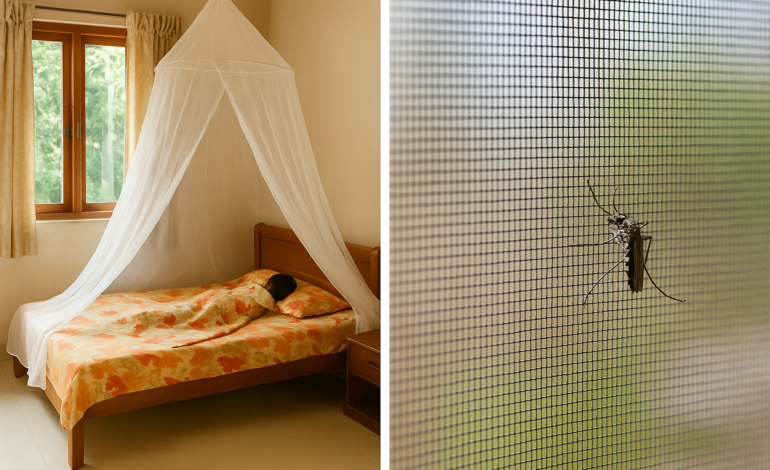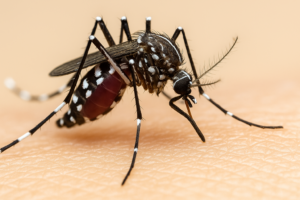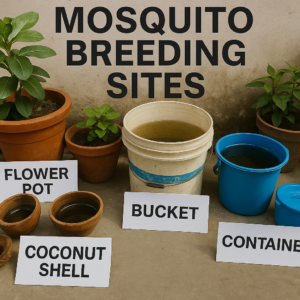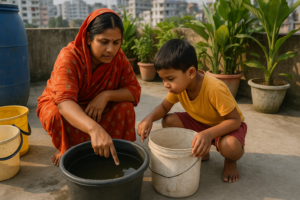Dengue Prevention Tips for Every Bangladeshi Household

Fighting Dengue Starts at Home: Tips Every Bangladeshi Household Should Know
Dengue isn’t just a seasonal scare—it’s a year-round threat in Bangladesh. But the fight starts right at home.
A Growing Concern for Bangladeshi Families
Every year, dengue fever sends thousands of Bangladeshis to hospital beds and claims hundreds of lives. The urban sprawl of Dhaka, the rising temperatures, and clogged drainage systems have made conditions ideal for the Aedes mosquito—the deadly carrier of dengue virus. In 2023 alone, Bangladesh recorded over 300,000 cases and more than 1,500 deaths, making it the country’s worst dengue outbreak in history.
But despite the alarming numbers, there’s a silver lining: dengue is preventable. And the most effective prevention starts not at hospitals or government offices, but in our homes.
This guide outlines practical, easy-to-implement tips for every Bangladeshi household to help stop dengue in its tracks—before it bites.
1. Know Your Enemy
Before you can protect your family from dengue, you need to understand the insect behind the illness: the Aedes aegypti mosquito. Unlike the common night-time mosquito most of us are familiar with, Aedes has its own unique behavior—and that’s what makes it so dangerous.
Daytime Biters
Aedes mosquitoes are active during early morning and late afternoon, not at night like many other mosquitoes. This means using bed nets only at night isn’t enough. During the day, you’re still vulnerable—especially during school runs, office hours, and household chores.
Loves Clean, Still Water
Here’s what surprises many: Aedes mosquitoes don’t breed in dirty drains—they breed in clean, stagnant water. Think about the flowerpot saucers on your balcony, the open water buckets in your bathroom, or the unused cooler on your rooftop. Even a small puddle in a coconut shell or discarded bottle cap can become a breeding site.
Doesn’t Fly Far
Unlike other insects that can travel kilometers, Aedes mosquitoes usually stay within 100–200 meters of their breeding ground. That means if someone in your house is getting bitten, there’s a high chance the source is right inside your home or just outside it—your backyard, your neighbor’s garden, or even your own rooftop.
2. Eliminate Standing Water
If there’s one thing the Aedes mosquito needs to thrive, it’s still, stagnant water. Female mosquitoes lay their eggs in clean, unmoving water—and in just 7 to 10 days, those eggs can become full-grown, bloodsucking adults. That means within a single week, your home could go from mosquito-free to a breeding hotspot.
To prevent this, your goal is simple: cut off their nursery.

Where to Check: Common Breeding Spots Around the Home
You don’t need a swamp for mosquitoes to breed. Here are some everyday items that often go unnoticed—but could be filled with rainwater or leftovers from daily use:
- Roof Drains and Clogged Gutters
Debris blocks drainage, turning rooftops into perfect pools for mosquitoes. Especially after a heavy rain, check for water that isn’t flowing away. - Unused Containers or Buckets Left Outside
Anything that can collect water—from paint cans to empty clay pots—should be turned upside down or stored indoors. - Air Coolers, Flower Vases, and Plant Trays
These are ideal mosquito breeding sites inside your home. Change the water every couple of days or clean them thoroughly. - Uncovered Water Tanks or Barrels
A missing or broken lid is an open invitation. Always keep water containers sealed or tightly covered. - Discarded Tyres, Coconut Shells, Broken Furniture
These are common in many Bangladeshi yards and alleyways. Rainwater can collect in them easily creating hidden mosquito factories.

Quick Prevention Tip: The 10-Minute Weekly Rule
Set aside just 10 minutes every week for a full home inspection. Check your rooftop, balconies, bathrooms, kitchen corners, and outdoor spaces. Empty, cover, or clean any place where water might collect. It’s a small effort with a massive impact.
3. Protect Your Living Spaces
Even if you manage to clean your surroundings, you can’t always control your neighbors’ rooftops or the local drainage system. But what you can control is your home environment. With the right steps, you can turn your living space into a mosquito-unfriendly zone—even in the peak of dengue season.
Use Physical Barriers: Block Mosquitoes from Getting In
Start with simple yet effective measures to keep mosquitoes outside where they belong:
- Install Mesh Screens on Windows and Doors
Fine wire or plastic mesh can stop mosquitoes from entering while still allowing air to circulate. Make sure there are no holes or gaps. - Use Mosquito Nets—Even During the Day
Aedes mosquitoes bite during the early morning and late afternoon, so don’t skip the net just because it’s not nighttime. If you’re napping during the day or have young children, a mosquito net is a must. - Apply Repellents
Use mosquito repellent creams, body sprays, or coils—especially in bedrooms, kitchens, and sitting areas. Look for repellents with DEET, picaridin, or natural ingredients like eucalyptus oil.
Keep Your Environment Clean: Don’t Invite Trouble Indoors
A tidy home isn’t just pleasant—it’s also safer from dengue:
- Cover All Water Containers Tightly
Whether it’s a water jug in the kitchen or a clay pitcher in the yard, mosquitoes can lay eggs if the container is left open—even indoors. - Clean and Scrub Flowerpots and Vases Weekly
Water sitting in plant trays or vases can turn into mosquito breeding sites. Wash them regularly and avoid overwatering. - Use Natural Repellents in Living Areas
Lemongrass, neem, tulsi (basil), and citronella are known for their mosquito-repelling properties. Place these plants in pots near windows or burn natural oils as a gentle indoor repellent.

Mosquito-Free Habits Matter
Even if the outside world feels out of your control, your home doesn’t have to be. With a few smart habits, you can make your living space a mosquito-free zone—keeping your family safe, comfortable, and one step ahead of dengue.
4. Dress to Defend
What you wear matters—especially in peak dengue seasons (June to October).
- Cover up: Wear long-sleeved shirts, full pants, and socks.
- Choose light-colored clothes: Mosquitoes are more attracted to dark colors.
- Avoid perfume-heavy products: Some scents attract mosquitoes.
If you have school-going children, make sure they’re appropriately dressed and use repellent patches or lotion.
5. Keep the Neighborhood Clean
You can’t fight dengue alone. Your efforts at home won’t work if your neighborhood is a breeding ground.
Here’s what you can do:
- Organize clean-up drives: Encourage your neighborhood to inspect rooftops, drains, and gardens weekly.
- Coordinate with local authorities: Report abandoned houses or plots with stagnant water.
- Use social media wisely: Share awareness tips in community WhatsApp or Facebook groups.
Involving everyone—from children to elderly members—makes a bigger impact than any fogging campaign.
6. Don’t Rely Solely on Fogging
When dengue cases begin to rise, many people pin their hopes on the city corporation’s fogging trucks. While fogging may look dramatic—billowing clouds of smoke sweeping through neighborhoods—it’s important to understand that this method is not a cure-all.
Fogging Only Kills Adult Mosquitoes
The insecticide used in fogging targets adult mosquitoes that are flying around at the time of spraying. It does not kill eggs, larvae, or pupae, which are often hidden in standing water inside homes or on rooftops. That means new mosquitoes can hatch within days—even after fogging has been done.
Short-Term Effectiveness
Fogging provides only temporary relief. Within a few hours, the effect wears off and mosquitoes can return. Without addressing the root causes—the breeding sites—the cycle continues.
Health and Environmental Concerns
Frequent or poorly regulated fogging can be harmful. The chemicals used may cause respiratory irritation, especially for children, the elderly, and those with asthma. It can also harm beneficial insects and local ecosystems, especially when overused.
Take Control
Instead of waiting for fogging trucks to pass by, focus on what you can control:
- Remove standing water weekly
- Keep your surroundings clean and dry
- Use indoor repellents and barriers consistently
Fogging should be seen as a supportive tool, not a primary solution. The most effective dengue prevention starts within your own four walls.
7. Stay Vigilant During the Monsoon
The months between June and October see a sharp rise in dengue cases due to waterlogging and high humidity.
During monsoon:
- Inspect your home twice a week.
- Pay special attention to your rooftop, balcony, and garden.
- Watch out for mosquito bites even during daytime naps.
This is when mosquitoes multiply faster than ever—and your precautions need to double.
8. Learn to Recognize Dengue Symptoms Early
Quick action can save lives. Symptoms usually appear 4–7 days after a mosquito bite.
Common dengue symptoms:
- Sudden high fever
- Severe headache and pain behind the eyes
- Joint and muscle pain (“breakbone fever”)
- Skin rashes
- Nausea or vomiting
- Bleeding gums or nose (in severe cases)
If you or a family member has these symptoms—avoid painkillers like ibuprofen, which can worsen bleeding. Instead, consult a doctor immediately.
9. Myths vs Facts: What Bangladeshis Need to Stop Believing
Misinformation can be deadly. Let’s bust some common dengue myths.
| Myth | Fact |
|---|---|
| “Only dirty water breeds mosquitoes.” | Aedes mosquitoes prefer clean water. |
| “Dengue spreads from person to person.” | It spreads only through infected mosquito bites. |
| “Dengue mosquitoes bite at night.” | Aedes bite during the day. |
| “Papaya leaf juice cures dengue.” | No scientific evidence supports this. It may help platelets, but it’s not a cure. |
Always rely on trusted medical advice—not social media forwards.
10. Special Care for Vulnerable Groups
Certain groups are at greater risk of complications:
- Children under 10
- Elderly people
- Pregnant women
- People with weak immune systems
Make sure these groups are extra protected. Avoid outdoor activities during peak mosquito hours and keep their sleeping areas mosquito-free.
11. Natural Remedies That Help (But Don’t Replace Medical Treatment)
When a loved one is diagnosed with dengue, many families in Bangladesh turn to natural remedies hoping for quick recovery. While there is no natural cure for dengue, certain home-based treatments can offer supportive relief and help the body fight the virus more effectively. However, it’s critical to understand that these remedies should never replace proper medical care.
Papaya Leaf Extract (Only Under Doctor’s Guidance)
Papaya leaf juice is a popular remedy believed to help raise platelet count, which drops dangerously low in severe dengue cases. Some small studies and anecdotal evidence support its use—but it must be taken only under a doctor’s supervision, as incorrect dosage can lead to complications.
Neem Leaves for Inflammation
Neem (neem pata) has long been known for its anti-inflammatory and antiviral properties. Consuming neem leaf juice or a mild neem tea may help reduce body inflammation and support immune response, though it’s not a cure.
Giloy (Tinospora Cordifolia) Juice
Known as giloy in Ayurvedic medicine, this climbing herb is believed to boost immunity and fight viral infections. It’s often consumed as juice or a supplement to help the body cope with fever and fatigue during dengue. Again, consult a healthcare provider before use, especially for children or pregnant women.
Hydration is Non-Negotiable
Dengue can cause severe dehydration, especially when accompanied by fever, vomiting, or diarrhea. Natural fluids like:
- Coconut water
- ORS (Oral Rehydration Solution)
- Fresh fruit juices can help maintain electrolyte balance and support recovery. Keeping the patient hydrated is one of the most important parts of home care.
Natural remedies can offer symptom relief and immune support, but they are not a substitute for blood tests, hospital observation, or doctor-prescribed medications. Delaying medical treatment can turn a mild case of dengue into a life-threatening situation.
When in doubt, always seek medical help first—and use natural methods only as supportive care.

12. Turn Prevention into Habit
Here’s a simple weekly checklist every Bangladeshi family should follow:
-
Clean flowerpots and trays
-
Empty and scrub unused buckets and containers
-
Clear rooftop of any stagnant water
-
Check under beds, behind doors for hidden breeding spots
-
Use mosquito repellents or nets
-
Educate your family—especially children
Put this checklist on your fridge or front door to remind everyone.
13. Government Resources and Where to Seek Help
In case of suspected dengue, seek help from:
- Government hospitals like DMCH, BSMMU, or Mitford
- Dengue Helpline Numbers provided by DGHS
- Private labs for quick blood tests (check platelet count, NS1 antigen)
Some wards also offer free larvicide or breeding control sprays—check with your local City Corporation office.
The Fight Begins at Your Doorstep
Dengue may seem like an unstoppable epidemic, but every Bangladeshi household has the power to reduce its impact. You don’t need expensive sprays or international aid—just awareness, consistency, and a sense of responsibility.
Fighting dengue doesn’t start with fogging trucks. It starts with you—checking that water bucket on your rooftop, closing that open tank lid, and teaching your child because a mosquito bite is more than just a nuisance.
Let’s turn every home into a fortress. Because in the war against dengue, prevention is the only cure.
Dengue isn’t the only threat floating in the air…
While we’re busy fighting mosquitoes, toxic air is silently weakening our immune systems—making us even more vulnerable. Don’t miss this eye-opening report on Chattogram’s growing air pollution crisis: Chattogram Air Pollution: A Growing Threat to Health







